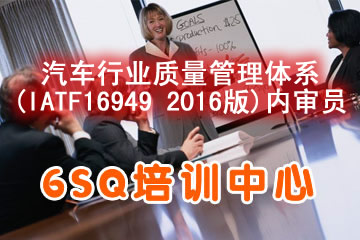SPC Knowledges
Dear friends of 6SQ,
My teacher, Prof Wu, is teaching me to learn SPC knowledges. I knew him on this website in 2013, so I'd like to share these knowledge points to this forum. Of course, I also look forward to seeing your views in the comments area. SPC knowledges will be updated continually. I hope we can learn it together. Thanks for your attention.
SPC is a technique to improve the effectiveness and efficiency of a process.
First, let us know the background of SPC
The story started on June 24, 1980, when NBC broadcasted an episode titled "If Japan can, why can't we?" From then on, America discovered the reason why Japanese had been doing so well in the auto and electronics industries in more than a decade prior to 1980. The secret? Quality products and services, and statistics. It turned out that the Japanese learned all the tricks from Dr Deming right after the WWII.
Note: You may search online about the two topics of 1. If Japan can, why can’t we? And 2. Deming prize.
To show gratitude, the Japanese Union of Scientists and Engineers(JUSE) established Deming Application Prize in his honor to acknowledge those companies who did well in “Total Quality Control”. Four companies received the First Deming Application Award in 1951. Almost 70 years ago.
The spirit of TQC/TQM: employing statistical methods to conduct continuous process improvement. And, we must first establish the process and then, we can study and find ways to continually improve the process.
When Deming was invited to give a lecture at Ford, the first question he asked was:” how many processes do you want to improve?” Processes? Puzzled by many Ford executives. Then, they started to identify their "processes"
The first step:
Develop all the processes that you're involved in.
The second step:
Identify the metrics of the steps in the processes that you can measure.
Then, conduct PDCA to improve these metrics continuously.
DeMing's famous words:
Show me the number! No numbers? No improvement!
...
My teacher, Mr. Ben, lives abroad. He not only wants to help all 6SQ's friends to learn SPC/TQM knowledges, but also hopes that the quality mangers' English Level can be improved at the same time. However, he can’t publish any topic here because of network issue of abroad. The topic I created would also not be updated. A new topic will be created according to my teacher’s advice.
SPC/TQM
Note:
When you see this topic, maybe there are some doubts. For example, why is the topic in English? In fact, my English skill is limited. Learning English version of SPC knowledge is also a big challenge for me. I hope that not only can I learn SPC knowledges through the method, but also my English ability can be improved. I post my teacher's opinions below. If you are interested in the English version of SPC knowledge, don’t forget to pay attention to the topic.
“Shirley and I have been communicating in English for quite some time. We like this challenge, because English is an international language and a vital tool that we should master, so that we can learn from the world and become more effective “quality management” practitioners.”
My teacher, Prof Wu, is teaching me to learn SPC knowledges. I knew him on this website in 2013, so I'd like to share these knowledge points to this forum. Of course, I also look forward to seeing your views in the comments area. SPC knowledges will be updated continually. I hope we can learn it together. Thanks for your attention.
SPC is a technique to improve the effectiveness and efficiency of a process.
First, let us know the background of SPC
The story started on June 24, 1980, when NBC broadcasted an episode titled "If Japan can, why can't we?" From then on, America discovered the reason why Japanese had been doing so well in the auto and electronics industries in more than a decade prior to 1980. The secret? Quality products and services, and statistics. It turned out that the Japanese learned all the tricks from Dr Deming right after the WWII.
Note: You may search online about the two topics of 1. If Japan can, why can’t we? And 2. Deming prize.
To show gratitude, the Japanese Union of Scientists and Engineers(JUSE) established Deming Application Prize in his honor to acknowledge those companies who did well in “Total Quality Control”. Four companies received the First Deming Application Award in 1951. Almost 70 years ago.
The spirit of TQC/TQM: employing statistical methods to conduct continuous process improvement. And, we must first establish the process and then, we can study and find ways to continually improve the process.
When Deming was invited to give a lecture at Ford, the first question he asked was:” how many processes do you want to improve?” Processes? Puzzled by many Ford executives. Then, they started to identify their "processes"
The first step:
Develop all the processes that you're involved in.
The second step:
Identify the metrics of the steps in the processes that you can measure.
Then, conduct PDCA to improve these metrics continuously.
DeMing's famous words:
Show me the number! No numbers? No improvement!
...
My teacher, Mr. Ben, lives abroad. He not only wants to help all 6SQ's friends to learn SPC/TQM knowledges, but also hopes that the quality mangers' English Level can be improved at the same time. However, he can’t publish any topic here because of network issue of abroad. The topic I created would also not be updated. A new topic will be created according to my teacher’s advice.
SPC/TQM
Note:
When you see this topic, maybe there are some doubts. For example, why is the topic in English? In fact, my English skill is limited. Learning English version of SPC knowledge is also a big challenge for me. I hope that not only can I learn SPC knowledges through the method, but also my English ability can be improved. I post my teacher's opinions below. If you are interested in the English version of SPC knowledge, don’t forget to pay attention to the topic.
“Shirley and I have been communicating in English for quite some time. We like this challenge, because English is an international language and a vital tool that we should master, so that we can learn from the world and become more effective “quality management” practitioners.”
没有找到相关结果
已邀请:





3 个回复
洛客 (威望:13) (海外 海外) 咨询业 总监
赞同来自: Shirley_Hou